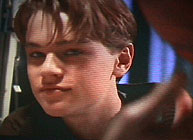|
|
|
|
The
Basketball Diaries
|
 |
|
I have heard it said that all films about junkies are inherently boring, because junkies are themselves boring. However, one does not need to entertain any romance about hard drugs in life to find many movies on this topic – from Pure Shit (1975) to Bad Lieutenant (1992), not forgetting Pulp Fiction (1994) – absolutely riveting. For me, the best drug movies belong to a tradition that can be called the cinema of sensation. Perhaps Coppola's sublime Rumble Fish (1983) captured the mood best: the film enters the hazy head of its intoxicated hero and proceeds to cruise along, alternating violent, harsh sensations with cool, dreamy ones. In this fantasy world, all firm moral values become strangely warped and relative – and that, too, can be a blessing for filmgoers. The Basketball Diaries, based on the autobiography of punk poet and singer Jim Carroll, could easily have taken a place in this disreputable pantheon of amoral, drug-addled movies. Alas, it is a bloodless, mediocre affair, with none of the disturbing intensity of Carroll's own art. Director Scott Kalvert, here making his feature debut, brings very little skill to this project. Between horribly clichéd hallucination images (such as slow-motion running in a field of flowers), the film depicts the rapid decline of young Jim (Leonardo DiCaprio) into a hellish cycle of addiction and crime. Jim's urban milieu is presented in a drearily predictable mode of "kitchen sink" realism. An anguished mother (Lorraine Bracco) yells and sobs, as a hand-held camera bobs around her; a gang of mates roams the mean streets looking for cheap thrills, while aggro rock blares on the soundtrack. Kalvert harps, with excessive sentimentality, on the contrast between Carroll's glory days as a basketball player and his destitution in alleyways. The most difficult part of this story is to show how, despite or perhaps even because of drugs, Carroll became a distinguished writer. The Basketball Diaries is, in its own kinky way, a "portrait of the artist as a young man". Yet here the film faces the age-old problem of many bio-pics of artists. Endless shots of an earnest DiCaprio scribbling in his diary at the starts and ends of scenes do not even begin to penetrate the intricate mysteries of literary creation. Does the film's nasty, thoroughly objectionable streak of homophobia derive from Carroll's book? This forms a quite obsessive pattern. At school, a "perverted" religious teacher canes Jim's bottom with glee. Then his creepy basketball coach propositions him in the shower room. The height of his "degradation" occurs when he lets another man suck his penis for money. Finally off drugs, Jim boasts proudly that in jail he avoided the advances of the "asshole brigade". All this rang an odd, vague bell in my mind. Then I remembered where I had previously encountered a very similar pattern. In the '60s, comedian Oscar Levant (Gene Kelly's sidekick in An American in Paris [1951]) wrote a showbiz autobiography. Amidst all the brittle, lightly charming reminiscences about famous names, places and shows, one quality of Levant's sensibility stood out above all else – his paranoid, homophobic loathing. According to Levant, de-lovely Cole Porter was a disgusting character because he insinuated secret gay messages into his song lyrics (especially "I've Got You Under My Skin"!). And when Levant – who had his own brush with drug addiction – lay doped up in a hospital, he was sure that the "male nurses" were doing terrible things to him. Times have certainly changed since Levant's ravings but, judging by The Basketball Diaries, it seems that the collision of drugs, art, celebrity and sensation in the male psyche can still give rise to some pretty horrid side-effects. © Adrian Martin September 1995 |
![]()